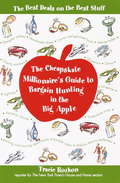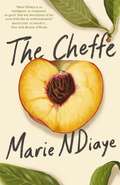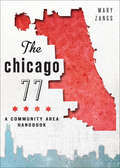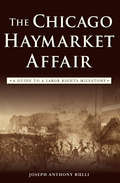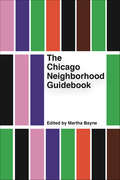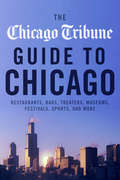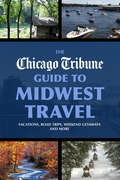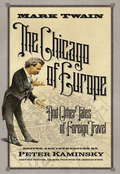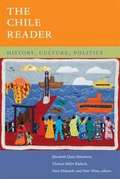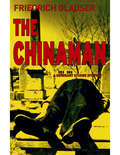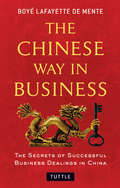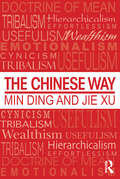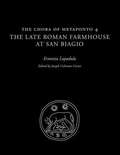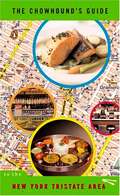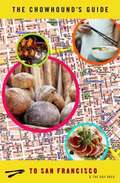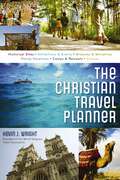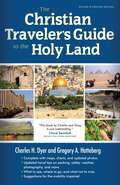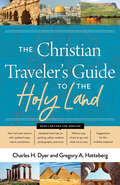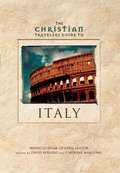- Table View
- List View
The Cheapskate Millionaire's Guide to Bargain Hunting in the Big Apple
by Tracie RozhonWe snap to attention when we hear about urban miracles: the designer jacket picked up for a pittance, the killer apartment snagged for next to nothing, swank furnishings found at garage-sale prices. Treasures like these in New York City--where it often seems the best things are reserved for the wealthy--can now be yours, thanks to New York Times House and Home reporter Tracie Rozhon, a bona fide expert on how to live the good life in Gotham. InThe Cheapskate Millionaire's Guide to Bargain Hunting in the Big Apple, Rozhon shares her most closely held shopping secrets with the reader. She knows New York bargains inside and out, from the Lower East Side to suburban outlet stores, from estate sales to flea markets. Each chapter of her informative book concludes with an extensive listing of sources and services--complete with names, addresses, and phone numbers--and is loaded with great ideas on how you can find deals in clothes and jewelry (dream coats, designer labels, furs, diamonds, pearls) home furnishings (couches, chairs, rugs, draperies, fabrics, antiques, lamps, wallpaper) apartments, co-ops, and condos (buying and renting) home renovation (paint, lumber, hardware, bathroom fixtures, cabinets, appliances) food (gourmet groceries, caviar, coffee, wine, restaurant meals) nightlife (entertainment, clubs, bars) More than just a bargain hunter's guide, this book is a bargain hunter's dream. Tracie Rozhon shows you how to think like a cheapskate millionaire, so you can apply her shopping know-how to anything you hope to buy. You don't need to be a Rockefeller to grab what the Big Apple has to offer. . . but you do need this book's inspired advice.
The Cheffe: A Culinary Novel
by Marie NDiayeThe Cheffe is born into a very poor family in Sainte-Bazeille in south-western France, but when she takes a job working in the kitchen of a couple in the Landes region, it does not take long before it becomes clear that the Cheffe has an unusual, remarkable talent for cooking. She dreams in recipes, she's always imagining food combinations and cooking times, she hunts down elusive flavours and aromas, and she soon usurps the couple's cook.But for all her genius, the Cheffe remains very secretive about the rest of her life. She becomes pregnant, but will not reveal her daughter's father. She shares nothing of her feelings or emotions. And when the demands of her work and caring for her child become too much, she leaves her baby in the care of her family, and sets out to open her own restaurant, which will soon win rave reviews and be lauded by all.But her relationship with her daughter will never be easy, and before long, it will threaten to destroy everything the Cheffe has spent her life perfecting.
The Chicago 77: A Community Area Handbook (History And Guide Ser.)
by Mary ZangsAn entertaining guidebook to the city&’s many communities with maps, landmarks, history, and fun facts.With over two hundred neighborhoods divided into seventy-seven community areas, Chicago offers a dazzling and daunting challenge to ambitious tourists and lifelong citizens. This blend of history and travel guide introduces you to them. Anyone who&’s never been to Chicago will be shocked to learn how big it really is. Did you know that Humboldt Park isn&’t even in Humboldt Park? Confused about the exact boundaries of West Elsdon or curious about the origins of the famous Second City Theater? In a handbook that is both an entertaining adventure and a methodical survey, Mary Zangs tackles all seventy-seven communities, providing maps, points of interest, and local perspectives for the many places Chicagoans call home.
The Chicago Chef's Table: Extraordinary Recipes from the Windy City (Chef's Table)
by Amelia LevinOnce considered a city simply of steakhouses and deep-dish pizza joints, Chicago has morphed into a vibrant and rich collection of second-generation, energetic chefs seeking to forge strong relationships with local producers and the diners they look to inspire. Master Chef Rick Bayless, Stephanie Izard of Girl & the Goat, Tony Mantuano of Spiaggia, and Paul Kahan with his slew of award-winning restaurants are just a few of the top chefs making headlines not only in Chicago&’s food pubs but also nationwide. The Chicago Chef&’s Table gathers Chicago&’s best chefs and restaurants under one cover. Profiling over 60 signature &“at home&” recipes from some of Chicago&’s beloved dining establishments. The book is a celebration of Chicago itself and its modern Midwestern cuisine.
The Chicago Haymarket Affair: A Guide to a Labor Rights Milestone
by Joseph Anthony RulliThis history and guide presents the significant sites and events of the Haymarket Square riot, a major turning point in the fight for workers&’ rights. On May 4th, 1886, a bomb exploded during a labor demonstration near Haymarket Square in Chicago. The ensuing gunfire and chaos brought a grisly end to what began as peaceful support for an eight-hour workday. With both officers and civilians dead, newspapers proclaimed an anarchist conspiracy. The investigation led to the trial and execution of rally organizers. The incident also drew irrevocable attention to debates about workers&’ rights and the role of law enforcement that continues today. In this guide to the key moments and sites of one of Chicago&’s most confusing and chaotic events, author Joseph Anthony Rulli aims to establish a clearer understanding of its historical significance.
The Chicago Neighborhood Guidebook (Belt Neighborhood Guidebooks)
by Martha BaynePart of Belt's Neighborhood Guidebook Series, The Chicago Neighborhood Guidebook is an intimate exploration of the Windy City's history and identity. "Required reading"-- The Chicago Tribune Officially,
The Chicago Tribune Guide to Chicago: Restaurants, Bars, Theaters, Museums, Festivals, Sports, and More
by Chicago TribuneA guide to the best of the city from its premier newspaper.The Chicago Tribune Guide to Chicago is a convenient travel guide for the Chicago area, with recommendations from knowledgeable insiders. Drawing on the extensive expertise of the city’s most prominent newspaper, it’s perfect for tourists and locals alike. Whether you’re planning a weekend getaway or an afternoon on the town, you can discover the best Chicago has to offer in dining, entertainment, museums, lodging, sports, and more.You’ll find top-notch pointers on what to do, where to go, and how to get there—including out-of-towner alerts that warn you about some of the city’s geographical quirks—as well as photos, local trivia, and descriptions and details for every recommended destination. With this authoritative guide, visitors can stay in the Loop—or wander well beyond it.
The Chicago Tribune Guide to Midwest Travel: Vacations, Road Trips, Weekend Getaways and More
by Chicago Tribune StaffThe Chicago Tribune Guide to Midwest Travel, composed of articles from the Chicago Tribune's travel experts, is a convenient and unique handbook for traveling throughout the Midwest. The book is organized by state, then features general recommendations for restaurants, museums, hotels, and outdoor activities. Also included are insights on travel accessories, mobile apps, outdoor gear, technology, and even tips on taking the best vacation photography. This book offers a diverse variety of experts' advice, making it well-suited for any kind of travel: family vacation, weekend getaways, and even business travel. The Chicago Tribune Guide to Midwest Travel reveals destinations, festivals, and attractions that easily may have been overlooked otherwise. Whether readers want to visit a new region or embark on a nearby adventure, this one-of-a-kind guide from a trusted source will make any trip more memorable.
The Chicago of Europe: And Other Tales of Foreign Travel
by Mark TwainTravel yarns that only America’s best-loved author could spin.With a sharp eye and an even sharper wit, Twain is the quintessential tour guide to 19th-century America. Dispatches showcasing his caustic, gimlet-eyed humor will take readers on a trot around the globe, from Hawaii to the Holy Land to Berlin (“Europe’s Chicago”). The delicious assemblage of 68 tales features Twain’s trademark style—a combination of breezy insouciance and droll barbarism—at its very best.
The Children
by Carolina SanínOne day, as she enters her local supermarket, Laura Romero has a startling encounter with a beggar, who seems to offer her a child. A short while later, in the middle of the night, she discovers a mysterious young boy on the pavement outside her apartment building: Fidel, who is six years old, a child with seemingly no origins or meaning. With few clues to guide her as she tries to discover his real identity, Laura finds herself swept into a bureaucratic maelstrom of fantastical proportions. From the National Institute for the Welfare of Families to the Hearth & Home Centre, from imagined worlds to lost loves, The Children explores the limits of isolation and intimacy, motherhood, neglect and compassion, filtered through the lives of two lonely people, whose coming together is less for company and more to share their loneliness.A tender, intelligent novel from a startling and brilliant new voice in English translation.Translated from the Spanish by Nick Caistor
The Chile Reader: History, Culture, Politics
by Peter Winn Elizabeth Quay Hutchison Thomas Miller Klubock Nara B. MilanichThe Chile Reader makes available a rich variety of documents spanning more than five hundred years of Chilean history. Most of the selections are by Chileans; many have never before appeared in English. The history of Chile is rendered from diverse perspectives, including those of Mapuche Indians and Spanish colonists, peasants and aristocrats, feminists and military strongmen, entrepreneurs and workers, and priests and poets. Among the many selections are interviews, travel diaries, letters, diplomatic cables, cartoons, photographs, and song lyrics.Texts and images, each introduced by the editors, provide insights into the ways that Chile's unique geography has shaped its national identity, the country's unusually violent colonial history, and the stable but autocratic republic that emerged after independence from Spain. They shed light on Chile's role in the world economy, the social impact of economic modernization, and the enduring problems of deep inequality. The Reader also covers Chile's bold experiments with reform and revolution, its subsequent descent into one of Latin America's most ruthless Cold War dictatorships, and its much-admired transition to democracy and a market economy in the years since dictatorship.
The Chinaman
by Mike Mitchell Friedrich Glauser"After reading Friedrich Glauser's dark tour de force In Matto's Realm, it's easy to see why the German equivalent of the Edgar Allan Poe Award is dubbed 'The Glauser.'"--The Washington PostPraise for the Sergeant Studer series:"Thumbprint is a fine example of the craft of detective writing in a period which fans will regard as the golden age of crime fiction."--The Sunday Telegraph"In Matto's Realm is a gem that contains echoes of Dürrenmatt, Fritz Lang's film M and Thomas Mann's The Magic Mountain. Both a compelling mystery and an illuminating, finely wrought mainstream novel."--Publishers WeeklyWhen, in later years, Sergeant Studer told the story of the Chinaman, he called it the story of three places, as the case unfolded in a Swiss country inn, in a poorhouse, and in a horticultural college. Three places and two murders. Anna Hungerlott, supposedly dead from gastric influenza, left behind handkerchiefs with traces of arsenic. One foggy November morning the enigmatic James Farny, nicknamed the Chinaman by Studer, was found lying on Anna's grave. Murdered, a single pistol shot to the heart that did not pierce his clothing. This is the fourth in the Sergeant Studer series. Friedrich Glauser is a legendary figure in European crime writing. He was a morphine and opium addict much of his life and began writing crime novels while an inmate of the Swiss asylum for the insane at Waldau.
The Chinese Way in Business
by Boyé Lafayette De MenteThis book is a comprehensive, expert guide to doing business in China.Western technology, management expertise and capital have fueled an incredible expansion of China's economy. Trade with China is at an all time high and so are the numbers of Westerners travelling to China for business. Business from China has also picked up as Chinese firms look to expand abroad. Understanding the ins and outs of the confusing and often contradictory Chinese business culture can lend an enormous advantage. The Chinese Way in Business is an invaluable tool that teaches Westerners the basic Chinese philosophy of doing business and how to cultivate strong personal relationships with Chinese business people and Chinese nationals.The author, Boye Lafayette De Mente worked in Asia for over thirty years as a journalist and business consultant and has long been considered an authority on East Asian business. In this book, he reveals the historical factors, collective traits and individual qualities that determine how the Chinese do business today, and the direction their economy will take in the future. His is a true insider's view-whether the topic is the legal framework for business development, or the importance of social relationships to successful business dealings in China.
The Chinese Way in Business
by Boyé Lafayette De MenteThis book is a comprehensive, expert guide to doing business in China.Western technology, management expertise and capital have fueled an incredible expansion of China's economy. Trade with China is at an all time high and so are the numbers of Westerners travelling to China for business. Business from China has also picked up as Chinese firms look to expand abroad. Understanding the ins and outs of the confusing and often contradictory Chinese business culture can lend an enormous advantage. The Chinese Way in Business is an invaluable tool that teaches Westerners the basic Chinese philosophy of doing business and how to cultivate strong personal relationships with Chinese business people and Chinese nationals.The author, Boye Lafayette De Mente worked in Asia for over thirty years as a journalist and business consultant and has long been considered an authority on East Asian business. In this book, he reveals the historical factors, collective traits and individual qualities that determine how the Chinese do business today, and the direction their economy will take in the future. His is a true insider's view-whether the topic is the legal framework for business development, or the importance of social relationships to successful business dealings in China.
The Chinese Way: Walked Out Of The New Way Of Cancer Treatment With Immune Regulation And Control Of Combination Of Chinese And Western Medicine
by Min Ding Jie XuAs business becomes increasingly globalized and China establishes its growing role in the international business environment, developing an understanding of the complex culture is important to anyone acting in the global arena. This book offers readers a thorough and nuanced resource to that end, describing the ever-evolving Chinese way of life circa 2014, based on extensive primary and secondary data. Taking an anthropological approach to achieve a well-rounded representation, the book covers 51 topics that would have been studied if China were a newly discovered civilization. It explores the culture through its examination of the nine core concepts that best represent the Chinese way of life. While the book is a rigorous treatment of the Chinese way of life, it is also filled with personal stories and perspectives from close to 1000 successful Chinese from academia, business, and government. The Chinese Way equips international business students, scholars, and practitioners with a deep understanding of a society that is a major player in global business today and offers a foundation for successful business interactions with Chinese companies, organizations, and people.
The Chora of Metaponto 4: The Late Roman Farmhouse at San Biagio
by Erminia LapadulaThis volume in the Institute of Classical Archaeology’s series on rural settlements in the countryside (chora) of Metaponto presents the excavation of the Late Roman farmhouse at San Biagio. Located near the site of an earlier Greek sanctuary, this modest but well-appointed structure was an unexpected find from a period generally marked by large landholdings and monumental villas. Description of earlier periods of occupation (Neolithic and Greek) is followed by a detailed discussion of the farmhouse itself and its historical and socioeconomic context. The catalogs and analyses of finds include impressive deposits of coins from the late third and early fourth centuries AD. Use of virtual reality CAD software has yielded a deeper understanding of the architectural structure and its reconstruction. A remarkable feature is the small bath complex, with its examples of window glass. This study reveals the existence of a small but viable rural social and economic entity and alternative to the traditional image of crisis and decline during the Late Imperial period.
The Chowhound's Guide to the New York Tristate Area
by ChowhoundWith more than 740,000 visitors a month, Chowhound.com has become a favorite source of information for those who want to take their dining experiences off the beaten path. Few places on earth offer as many culinary opportunities as New York City, a town virtually synonymous with culinary variety, but many of its most unique dining experiences have remained unheralded-until now. From Chowhound.com comes the essential guide for anyone interested in a mouth-watering gastronomical adventure. The collective work of thousands of savvy food experts who have scoured every area of New York-as well as New Jersey and Connecticut-The Chowhound's Guide to the New York Tristate Area will satisfy every conceivable craving. Ignoring conventional wisdom, this guide will clue you in to L'Ecole's early bird service-where the teachers cook instead of the students-as well as the lowdown on the Arepa Lady's soulful corn cakes under the #7 train tracks. Reported with passion and humor, this is by far the richest chow treasure trove ever compiled.
The Chowhound's Guide to the San Francisco Bay Area
by ChowhoundWith more than 740,000 visitors a month, Chowhound.com has become a favorite source of information for those who want to take their dining experiences off the beaten path. So why should San Francisco eaters limit their choices to the same old locales found in most restaurant guides? As fun to read as it is comprehensive, The Chowhound's Guide to the San Francisco Bay Area is all about finding the perfect bite for every occasion, focusing on the undiscovered gems that will generate tomorrow's buzz. From the best Chinatown noodle shops and secret tamale ladies to sumptuous sushi meccas and sensational stock-up stops for a romantic Sonoma picnic, this is the richest treasure trove of San Francisco restaurants, cafes, take-out counters, delis, farmer's markets, and food carts ever compiled. On the web: http://www.chowhound.com
The Christian Travel Planner (Christian Travelers Guide)
by Kevin WrightThe Christian Travel Planner will enable you to plan and prepare for memorable and life-changing experiences. Discussing a multitude of trips, from Holy Land and European pilgrimage tours to mission trips and conference cruises, this book is accessible and user-friendly. Other vacations include fellowship vacations, camps, conventions, adventure vacations, and monastic guest-stays. Complete with stories, must-see descriptions, and website and travel reference information, this planner can also be used as a companion guide while traveling or simply from the comfort of your home, as you explore Christianity's famous sites via the computer. Learn how to begin or enrich a Christian travel ministry at your church, faith community, or organization. The Christian Travel Planner introduces readers to the world of faith-based travel and identifies the plethora of opportunities available to Christians planning a vacation.
The Christian Traveler's Guide to the Holy Land
by Charles H. Dyer Gregory A. HattebergSo you're going to Israel? Don't go without this guide. A trip to the Holy Land is, for most, a once-in-a-lifetime opportunity. In this one-stop guide, two professionals—Charles Dyer, a Bible scholar and veteran Holy Land tour guide, and Greg Hatteberg, graduate of the Institute of Holy Land Studies in Jerusalem—help you make the most of your trip. With detailed maps and a full-color 16-page photo insert, this book walks you through five key biblical regions: Israel, Egypt, Greece, Jordan, and Turkey, giving you a preview of what&’s to come and helping you make the most of every moment along the way. Packing lists, jet lag tips, passport requirements, and a wealth of other practical information will assure you that have everything you need, while a four-week prayer guide and Bible study prepare you for the spiritual journey you are about to take. The Christian Traveler&’s Guide to the Holy Land traces the biblical events of over ninety of the most visited sites and will ensure that your trip is an exciting, spiritually satisfying, and unforgettable experience.This revised edition features newly excavated sites, up-to-date photos and maps, and relevant advice for preparing for and preserving your trip.
The Christian Traveler's Guide to the Holy Land
by Charles H. Dyer Gregory A. HattebergSo you're going to Israel? Don't go without this guide. A trip to the Holy Land is, for most, a once-in-a-lifetime opportunity. In this one-stop guide, two professionals—Charles Dyer, a Bible scholar and veteran Holy Land tour guide, and Greg Hatteberg, graduate of the Institute of Holy Land Studies in Jerusalem—help you make the most of your trip. With detailed maps and a full-color 16-page photo insert, this book walks you through five key biblical regions: Israel, Egypt, Greece, Jordan, and Turkey, giving you a preview of what&’s to come and helping you make the most of every moment along the way. Packing lists, jet lag tips, passport requirements, and a wealth of other practical information will assure you that have everything you need, while a four-week prayer guide and Bible study prepare you for the spiritual journey you are about to take. The Christian Traveler&’s Guide to the Holy Land traces the biblical events of over ninety of the most visited sites and will ensure that your trip is an exciting, spiritually satisfying, and unforgettable experience.This revised edition features newly excavated sites, up-to-date photos and maps, and relevant advice for preparing for and preserving your trip.
The Christian Traveler's Guide to the Holy Land
by Charles H. Dyer Gregory A. HattebergSo, you're going to Israel? Don't go without this guide.A trip to the Holy Land can be life changing. In this one-stop book, Charles Dyer—Bible scholar and veteran Holy Land tour guide—and Greg Hatteberg—graduate of the Institute of Holy Land Studies in Jerusalem—help you make the most of this opportunity.Prepare for your spiritual journey with a four-week prayer guide and Bible study. The Christian Traveler&’s Guide to the Holy Land traces the biblical events of over ninety of the most visited sites and will ensure that your trip is a spiritually satisfying and unforgettable experience.This revised edition features newly excavated sites, up-to-date photos and maps, and relevant advice for preparing for your trip. Dyer and Hatteberg walk you through five key biblical regions: Israel, Egypt, Greece, Jordan, and Turkey, helping you make the most of every moment along the way.More than just a Bible resource, you&’ll also find practical information such as packing lists, passport requirements, and practical tips for post-COVID travelers.
The Christian Travelers Guide to Italy
by Irving Hexham Caroline Mangone David BershadThe Christian Travelers Guides deal directly with what even the best general travel guides only touch on: Christianity’s enormous influence on Europe--and, through its history and culture, Europe’s influence on Christianity. This unique series guides you on a pilgrimage to the heart of our Christian heritage. Saints and secularists, martyrs and kings, castles and cathedrals, public squares and rolling hillsides, great works of art, literature, and architecture: The legacy of the Christian faith takes on immediacy and impact as you see firsthand the places where believers through the centuries lived and died, shaping our world with their faith. In rich detail and depth, The Christian Travelers Guide to Italy describes the history, literature, music, art, and architecture of Italy. Nearly 50 Christian Heritage Sites, with fascinating information on different places to visit List of "Top 10 Christian Sites in Italy" Insights for enjoying your visits to Italian churches and cathedrals Sidebars featuring mini-biographies of key historical figures and short essays on great works of art Glossary of religious terms Access The Christian Travelers Guides Website at http://www.christian-travelers-guides.com
The Christmas Holiday: The perfect heart-warming read full of festive magic
by Sophie Claire'A cosy and heart-warming Christmas read - the perfect festive treat' Heidi Swain'A fun and festive read' Trisha Ashley***Can a trip away lead you home?After a bad break-up, eternal optimist Evie Miller has moved to the small village of Willowbrook to finally pursue her dream of opening a craft shop. Unfortunately, with money worries and an ex-boyfriend determined to track her down, her fresh start isn't going entirely to plan.Jake Hartwood is also looking to escape his past. Haunted by the loss of his wife, he's determined not to get close to anyone again - and the last thing he wants is to be celebrating this December.Hoping to avoid the festivities, Evie and Jake arrange to escape Christmas together as friends in Provence. But will the magic of the season change things between them?And what happens if one of them starts to feel something more?*****Readers are loving The Christmas Holiday!'This was a wonderful festive story full of intrigue, drama and romance.' Five stars'A lovely heart warming story. Loved it.' Five stars'This is definitely a book to curl up with of an evening, a book to make you smile and feel happy. The characters are so lovely, the writing so warm.' Five stars'I loved this book, and read it in one sitting.' Five stars'A lovely heart-warming book that I could not put down. I really strongly recommend and can't wait to see what's next from this author!' Five stars(P)2019 Hodder & Stoughton Limited
The Christmas Holiday: The perfect heart-warming read full of festive magic
by Sophie Claire'A sumptuous Christmas romance' Woman & Home magazine'A cosy and heart-warming Christmas read - the perfect festive treat' Heidi Swain'A fun and festive read' Trisha Ashley***Can a trip away lead you home?After a bad break-up, eternal optimist Evie Miller has moved to the small village of Willowbrook to finally pursue her dream of opening a craft shop. Unfortunately, with money worries and an ex-boyfriend determined to track her down, her fresh start isn't going entirely to plan.Jake Hartwood is also looking to escape his past. Haunted by the loss of his wife, he's determined not to get close to anyone again - and the last thing he wants is to be celebrating this December.Hoping to avoid the festivities, Evie and Jake arrange to escape Christmas together as friends in Provence. But will the magic of the season change things between them?And what happens if one of them starts to feel something more?*****Readers are loving The Christmas Holiday!'This was a wonderful festive story full of intrigue, drama and romance.' Five stars'A lovely heart warming story. Loved it.' Five stars'This is definitely a book to curl up with of an evening, a book to make you smile and feel happy. The characters are so lovely, the writing so warm.' Five stars'I loved this book, and read it in one sitting.' Five stars'A lovely heart-warming book that I could not put down. I really strongly recommend and can't wait to see what's next from this author!' Five stars
